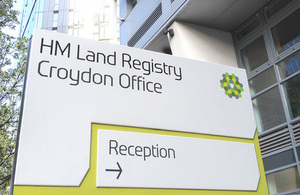HM Land Registry moves forward with digital conveyancing
Government approves changes to the rules that will enable future digital services.

Buying and selling your home without the need for paper deeds is one step closer today as the Government approves changes to the Land Registration Rules that will further enable digital land registration.
The changes, which will come into effect on 6 April 2018, are central to HM Land Registry’s ambition to become the world’s leading land registry for speed, simplicity and an open approach to data which it outlines in its new Business Strategy 2017 to 2022.
Chief Executive and Chief Land Registrar Graham Farrant sets out the changes to the way HM Land Registry will provide services to its customers including allowing for fully digital conveyancing documents with e-signatures.
Working closely with its customers, and launching a public consultation on the changes last year, HM Land Registry plans to use digital technology to make conveyancing simpler, faster and cheaper while enhancing the integrity and security of the register against threats from cyber-attacks and digital fraud. The rule changes will allow HM Land Registry to introduce fully digital conveyancing documents such as mortgages and transfers, in response to customers’ needs.
Chief Executive and Chief Land Registrar Graham Farrant said:
Our customers are central to everything we do and we want to make dealing with us quicker and simpler by providing more services through digital technology. These changes are an important enabler for our digital transformation and I want to thank our customers for their positive responses to the consultation.
Changes were required to the Land Registration Rules 2003, with the revocation of the Land Registration (Electronic Conveyancing) Rules 2008 and the Land Registration (Proper Office) Order 2013, in order to allow HM Land Registry to continue with its digital transformation programme, and modernise and simplify its services.
The changes will benefit customers by allowing HM Land Registry to build new and more flexible statutory services that have been called for by the industry, and other electronic services will improve the assistance offered to them throughout the application process.
HM Land Registry will be contacting customers in the coming weeks to explain any changes that will affect the way they submit applications, though these are expected to be minimal, and will only affect a small number of customers.
Notes to editors
-
Read the Government response to the consultation for proposals to amend the Land Registration Rules 2003.
-
HM Land Registry’s mission is to guarantee and protect property rights in England and Wales.
-
HM Land Registry is a government department created in 1862. It operates as an executive agency and a trading fund and its running costs are covered by the fees paid by the users of its services. Its ambition is to become the world’s leading land registry for speed, simplicity and an open approach to data.
-
HM Land Registry safeguards land and property ownership worth in excess of £4 trillion, including around £1 trillion of mortgages. The Land Register contains more than 25 million titles showing evidence of ownership for some 85% of the land mass of England and Wales.
-
For further information about HM Land Registry visit www.gov.uk/land-registry.
Contact
Press Office
Trafalgar House
1 Bedford Park
Croydon
CR0 2AQ
Email HMLRPressOffice@landregistry.gov.uk
Phone (Monday to Friday 8:30am to 5:30pm) 0300 006 3365
Mobile (5:30pm to 8:30am weekdays, all weekend and public holidays) 07864 689 344